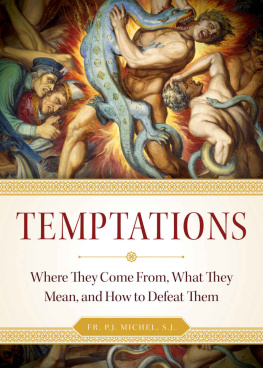Fr. P.J. Michel - Temptations
Here you can read online Fr. P.J. Michel - Temptations full text of the book (entire story) in english for free. Download pdf and epub, get meaning, cover and reviews about this ebook. year: 2017, publisher: Sophia Institute Press, genre: Religion. Description of the work, (preface) as well as reviews are available. Best literature library LitArk.com created for fans of good reading and offers a wide selection of genres:
Romance novel
Science fiction
Adventure
Detective
Science
History
Home and family
Prose
Art
Politics
Computer
Non-fiction
Religion
Business
Children
Humor
Choose a favorite category and find really read worthwhile books. Enjoy immersion in the world of imagination, feel the emotions of the characters or learn something new for yourself, make an fascinating discovery.
- Book:Temptations
- Author:
- Publisher:Sophia Institute Press
- Genre:
- Year:2017
- Rating:3 / 5
- Favourites:Add to favourites
- Your mark:
- 60
- 1
- 2
- 3
- 4
- 5
Temptations: summary, description and annotation
We offer to read an annotation, description, summary or preface (depends on what the author of the book "Temptations" wrote himself). If you haven't found the necessary information about the book — write in the comments, we will try to find it.
Temptations — read online for free the complete book (whole text) full work
Below is the text of the book, divided by pages. System saving the place of the last page read, allows you to conveniently read the book "Temptations" online for free, without having to search again every time where you left off. Put a bookmark, and you can go to the page where you finished reading at any time.
Font size:
Interval:
Bookmark:
R EV. P . J . M ICHEL, S . J .
TEMPTATIONS
Where They Come From,
What They Mean,
and How to Defeat Them

Translated from the French by
Rev. F. P. Garesch, S.J.
SOPHIA INSTITUTE PRESS
Manchester, New Hampshire
Copyright 2016 by John L. Barger
These pages are excerpted from Fr. Michels larger 1904 work, Spiritual Despondency and Temptations (New York: Benziger Brothers), and include minor editorial revisions.
Printed in the United States of America.
All rights reserved.
Cover and interior design by Perceptions Design Studio.
On the cover: The Torments of Hell (fresco), by Joseph Anton Koch (17681839) / Casino Massimo, Rome, Italy / Bridgeman Images.
Except where otherwise noted, Scripture passages are taken from the Douay-Rheims edition of the Old and New Testaments. Where applicable, quotations have been cross-referenced with the differing names and enumeration in the Revised Standard Version, using the following symbol: [RSV =].
No part of this book may be reproduced, stored in a retrieval system, or transmitted in any form, or by any means, electronic, mechanical, photocopying, or otherwise, without the prior written permission of the publisher, except by a reviewer, who may quote brief passages in a review.
Nihil obstat : Remigius LaFort, S.T.L., Censor
Imprimatur : John M. Farley
Archbishop of New York
New York, January 2, 1904
Sophia Institute Press
Box 5284, Manchester, NH 03108
1-800-888-9344
www.SophiaInstitute.com
Sophia Institute Press is a registered trademark of Sophia Institute.
Library of Congress Cataloging-in-Publication Data
TK
CONTENTS

CHAPTER 1

Temptations Are Not Proof of Gods Having Abandoned Us
T emptations trouble pious souls and plunge the dissipated over the precipice. In order to prevent the evil that temptations may produce, it is well to give you the reasons for not fearing them, the principles by which you should be guided on different occasions, the way in which you should behave when assailed and by which you may preserve yourself against their assaults, and, finally, the advantages you may derive from them.
A temptation is a thought, a feeling, an inclination, or a tendency that solicits us to violate the law of God for our own satisfaction. A temptation should neither trouble nor discourage a Christian soul.
The devil declares war especially against those who detest his rule, who fight against their passions, who are disciples of Jesus Christ as much by their purity of love as by the ineffaceable seal of regeneration, or against those who seriously think of throwing off the yoke that he has imposed upon them. In his attempts against them, he seeks only to make them renounce the love of Jesus Christ, to separate them from God by making them his partners in disobedience.
This reflection should be the consolation of those who are tempted. It is their contradiction with him, the enemy of their salvation, their love for piety and for the will of God, that draws upon them this persecution. A little perseverance will make them victorious and, above all, will strengthen them in virtue.
Souls who are naturally timid, or whom the Lord has conducted for a long time by a cessation of passion and the sweetness of peace, are apt to imagine that these temptations they sometimes experience are signs of Gods anger, and they even come to think themselves abandoned when the temptation becomes strong and frequent. They cannot persuade themselves that God can look with a favorable eye upon a heart agitated by sentiments so opposed to virtue.
This is the last resource of the enemy for the overthrow of a soul that he has been unable to seduce by the empty pleasures of vice. He takes away that precious confidence that would sustain it against all the assaults of hell.
Such souls are greatly deceived. Those who are instructed, who are better acquainted with the ways of providence, are not surprised at the struggle in which they are engaged. They have learned from the Holy Spirit that the life of man is a perpetual combat; that we are obliged to defend ourselves, without ceasing, from within, against our tastes, our inclinations, our self-love, domestic enemies who are ever ready to betray us by their snares and their suggestions; from without, against the influence of bad example, human respect, and the powers of hell, jealous of mans happiness and conspiring against him from the beginning of the world.
They know that it is only by the victories that we gain through the assistance of grace that we force our way to heaven, and that, according to the apostle, He also that striveth for the mastery is not crowned except he strive lawfully (2 Tim. 2:5).
St. Paul, although he prayed to be delivered from them, did not regard the temptations that he continued to experience as signs of Gods having abandoned him. The saints, so long and so violently attacked by the devil, even in the desert and in the exercise of the severest penance, also had not this idea of temptations. On the contrary, they always regarded temptations as the object of their struggles and the subject of their merit. They knew what was said in the Holy Scripture: Because thou wast acceptable to God, it was necessary that temptation should prove thee (Tob. 12:13).
This is the view that you too should take it is the only one that is correct according to the principles of religion and then you will no longer be troubled or discouraged.
But, although temptations are no sign of our being forsaken since God never entirely abandons man as long as he is alive and although they are generally a trial of the just, yet they are sometimes the effect of divine justice, which punishes thereby our negligence in the divine service, the weakness of slothful and presumptuous souls, and the indulgence of natural inclinations.
But whether they be a punishment or a trial, our submission in receiving them and our fidelity in resisting them must be still the same. From the most loving of Fathers we cannot expect a justice unaccompanied by mercy. His grace always follows on prayer and confidence. He does not desire our destruction; He punishes us only to regain us. And so far from being discouraged and troubled, we should be animated in the combat by the pardon that is extended to us, if, with a humble and contrite heart, we faithfully perform the penance that God imposes.
CHAPTER 2

Temptations Are Not a Sign of a Dangerous State of Soul
F requent temptations may prove that the heart is subject to passions and inclined to evil, but, when rejected, they do not indicate that it is bad or separated from God. This inclination to evil that we inherit as a consequence of the sin of our first parents is sometimes increased by the influence of the senses on the soul. They render us more or less subject to temptation, according as their impressions are more or less strong, and this, being independent of our will and not having its origin in the heart, does not indicate a vicious state. It is not the cause of this sensible disturbance; on the contrary, it suffers from it; and when from its love for virtue it corrects the inclination, strong as it may be, the heart certainly does not become the worse for the effort.
Next pageFont size:
Interval:
Bookmark:
Similar books «Temptations»
Look at similar books to Temptations. We have selected literature similar in name and meaning in the hope of providing readers with more options to find new, interesting, not yet read works.
Discussion, reviews of the book Temptations and just readers' own opinions. Leave your comments, write what you think about the work, its meaning or the main characters. Specify what exactly you liked and what you didn't like, and why you think so.













